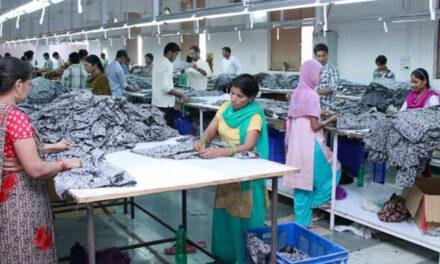 As the second largest producer of cotton in the world, the fastest growing consumer base and a significant section of the agriculture and industrial employment coming from the cotton textile value chain, Cotton is very important for India. Hence, the forthcoming 81stPlenary Meeting of International Cotton Advisory Committee (ICAC) to discuss the various aspects and issues of cotton is a very special event for India.
As the second largest producer of cotton in the world, the fastest growing consumer base and a significant section of the agriculture and industrial employment coming from the cotton textile value chain, Cotton is very important for India. Hence, the forthcoming 81stPlenary Meeting of International Cotton Advisory Committee (ICAC) to discuss the various aspects and issues of cotton is a very special event for India.
The four-day event, to be held from December 2 to 5, 2023, in the Jio World Convention Centre, Mumbai, with the theme “Cotton Value Chain: Local Innovations for Global Prosperity,” is expected to be an important occasion for India to showcase its innovations, sectoral vibrancy, and leadership in the cotton value chain.
Cotton cultivation plays a major role in sustaining the livelihood of an estimated 6.5 million cotton farmers and several million people engaged in related activities such as cotton processing and trade, thus, making Cotton the backbone of the Indian economy.
India has the highest area of cotton cultivation in the world, with around 13 million hectares under it and accounting for 23% of world production. Contrary to the global trends on fiber use, cotton based T&A products accounts for more than 60% of our T&A market. Cotton feeds into one of the most modernized spinning sectors in the world with the Indian textile sector witnessing investment in the latest technologies in the last one decade or more.
The various dimensions of cotton and it’s socio- economic influence on the global and Indian textile value chain is expected to be discussed at the ICAC event. But I think the most important development for the textile industry which we look forward to showcase at the event is the launch of the Indian brand of cotton i.e., “Kasturi Cotton Bharat”, a much needed quality and branding initiative. ‘Kasturi Cotton Bharat’ is aimed at strengthening India’s competitiveness in the global cotton market and create a sustainable ecosystem for all stakeholders involved.
The Confederation of Indian textile industry, erstwhile Indian Cotton Mills Federation, as one of the oldest Industry association, has been witness to the evolution of the Indian cotton textile industry for more than six decades. With the fast changing trends and demands of the fashion industry, I think the industry today needs to strengthen not just its quality and cost competitiveness but also positioning as a transparent, sustainable and socially inclusive sector. While our huge cotton farmers community is our strength, the small and fragmented nature of the majority land holdings and farmers limited bandwidth to adopt the latest technologies and innovations, besides growing technology gaps in mechanisation and seed varieties are challenges that the industry and Government need to work upon together to ensure fiber availability for feeding the projected growth of Indian textile industry.
Indian textile industry is looking at a USD 350 bn industry by 2030, which gives a huge scope for the cotton industry to grow. Emergence of a strong and organised Farmer Producer Organisations (FPOs), a never before synergised efforts by various ministries to address the agronomic, technological and financial challenges of the sector and a bold step towards Branding and Traceability are developments that give confidence to the stakeholders of a promising future.
The industry is also optimistic of the upcoming Free Trade Agreements that India is negotiating with important cotton textile destinations which can have an important bearing on the demand and supply factors of this sector.
Recognising the need for better engagement of the user and the producer industry, CITI’s Cotton Development and Research Association has been actively engaged in improving agronomic practices and farmers awareness of the new technologies and good practices. Better income and welfare of the farmers through balanced farming techniques that meet India’s need for enhanced productivity without compromising on the soil health or environmental impact is what the CITI CDRA works towards. The technical sessions at ICAC would be a great platform for institutions like this to exchange knowledge on feasible and adoptable new farming practices.
CITI as a co-host of the 81stPlenary Meeting of ICAC in India, invites all stakeholders to participate in the discussions on important aspects of Global Cotton including Climate change, organic cotton integrity, labeling, quality assurance, Climate-smart innovations, Genetics, pest management, price risk management, women empowerment, certification, etc.
Contributed by: Rakesh Mehra, Chairman, Confederation of Indian Textile Industry






















